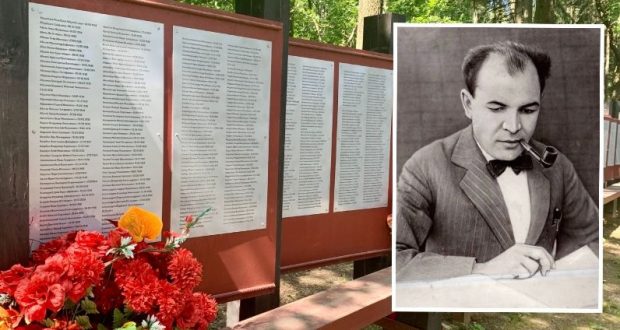The Tatarstan Representation honored the memory of Soviet diplomat Kerim Khakimov
July 03, 2020
The Plenipotentiary representative of Soviet Russia in the Arab countries Kerim Abdraufovich Hakimov made a significant contribution to the establishment of good relations between the young Soviet Union and the Arab-Persian world. In 1938, he was repressed and shot.
The body of an outstanding diplomat rests at the Kommunarka memorial cemetery. On this site from 1937 to 1941, a shooting range of the same name, a special object of the NKVD of the USSR, functioned in which repressions and burials of people sentenced to death were carried out.
Emil Fayzullin, Deputy Plenipotentiary of Tatarstan, laid flowers at the “Wall of Remembrance”, on which the name of Kerim Abdraufovich Khakimov was stamped, as well as the date of his death, 10.01.1938. In total, 6 609 names were included in the string of stands. They were identified by shooting acts in the Central Archive of the FSB.
“Red Pasha” and “the Arabian vizier of the Kremlin” – this is how contemporaries called Karim Abdraufovich Khakimov. Thanks to a deep knowledge of the history, traditions, customs of the Arabs, unusual tact, and the ability to win over people, Khakimov enjoyed great respect among the Yemenis and Saudis. They called him Karim Bey. The phenomenon of Kerim Khakimov also consisted in the fact that the ideas of communism were combined in him with Muslim education.
The future diplomat was born on November 28, 1892 (1890) in the family of Abdrauf and Hamida Khakimovs in the village of Dyusanovo, the Ufa province. The predominant nationality of the residents of this village are the Tatars. On the Internet you can find a diplomatic questionnaire, where Kerim Khakimov wrote with his own hand in the column “nationality” a Tatar.
In the past, he was a professional revolutionary, red commander and organizer of Soviet power.
Work in the diplomatic sphere began in 1920. It was from this time that his active work began, aimed at establishing close cooperation between the Soviet government and the Arab world.
The Arabs were amazed at his level of knowledge of their language, his ability to express thoughts deeply, ornately. He was entering the palaces, and the poor in their shacks joyfully accepted him.
Kerim Abdraufovich managed to establish friendly relations with the leaders of the Middle East countries. He negotiated privately with kings, crown princes and prime ministers. He was very respected and appreciated by the King of Saudi Arabia, Abdel Aziz.
In 1924, the young son of Khakimov, Shamil, died. According to legend, the ruler of Hijaz, the future king of Saudi Arabia, singled out a man who looked after his grave even after the recall of K.A. Khakimov to the USSR.
During the establishment of diplomatic relations between the USSR and Arab countries, Kerim Khakimov organized the supply of vital goods and products from the USSR, as well as the provision of medical assistance to the population.
In 1925, Khakimov performs a small Hajj – umru. This increases his importance in the eyes of the Arab elite. From 1926 to 1928, Kerim Khakimov was the plenipotentiary representative of the USSR in the Kingdom of Hijaz, Nedzh and the annexed regions (from 1932 – the Kingdom of Saudi Arabia).
Then for three years he was the plenipotentiary representative of the USSR in the Kingdom of Yemen, at the same time he held the position of general representative of the Middle East Trade.
In 1936, Kerim Hakimov became the plenipotentiary representative of the USSR in the Kingdom of Saudi Arabia. A year later, he was recalled to Moscow, where he was arrested and executed in 1938.
The repression of the Red Pasha and the subsequent execution made a deep impression on the representatives of the governing and still ruling dynasty of the Kingdom of Saudi Arabia. Diplomatic relations between this country and the USSR after the withdrawal of Khakimov were interrupted. And they did not resume until the fall of the communist system in the Soviet Union.

